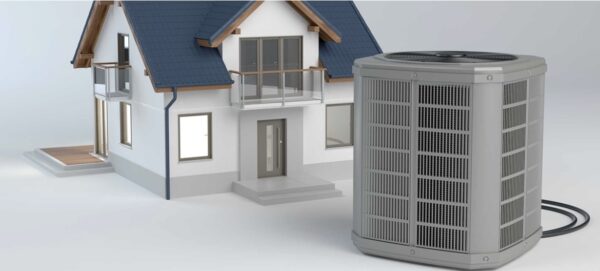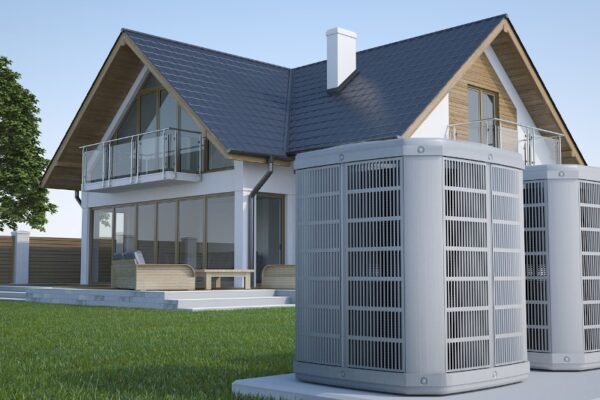
The Road to Net Zero: Are Heat Pumps the Right Route?

The UK government has a target of Net Zero for the country by the year 2050. One way in which we can get there is to improve the heating systems that our homes and businesses use, moving away from traditional fossil fuel consumption in the form of gas boilers and the like, towards commercial heat pumps and forms of renewable energy for residential properties that significantly reduce carbon emissions.
What is Net Zero?

In 2019, the UK was the first major economy that passed legislation committing to net zero emissions by the year 2050. The target is to reduce net greenhouse gas emissions by 100%, relative to levels found in the 1990s, by the middle of the century. It is clear for all to see that we are in the state of a climate emergency and that drastic action must be taken by governments the world over, by large multi-national corporations, and by all of us in the everyday actions that we take.
Net Zero is about balancing the carbon emitted into the atmosphere and the carbon removed from it. Net zero is only achieved once we are no longer adding more carbon to the atmosphere than we remove from it. This can be achieved through changes to the way we look at emissions from homes, agriculture, industry, and transportation. 2050 is the year chosen by the UK as it is a date that gives the world a better chance of avoiding a catastrophic temperature rise by the year 2100. 2050 is a challenging but achievable date to reach Net Zero, as long as action is genuinely taken now, and technologies are improved and changed before 2030.
The heat pump solution

By 2028 there is a target of 600,000 heat pump sales per year, hoping for a rise in these numbers throughout the 2030s to help the country reduce the carbon footprint of our country and to head towards Net Zero. Targeting household and commercial heating solutions in this way will make a big dent in the transformative change that is required to meet Net Zero.
Heat pumps are a relatively new technology, taking heat from the ground, water, or the air to circulate around a central system that is used to provide hot water, heating, and cooling provisions for properties. It is a much cleaner alternative to gas, which is the way that most properties are currently heated.
As the target for heat pump sales continues to rise, so too will the need for knowledgeable installers who can support this shift. Air Source Heat Pump Installation professionals are essential for guiding customers through the complexities of choosing and installing the right system for their needs. Their expertise not only ensures that the installation process is seamless but also educates property owners about the long-term benefits and maintenance of their new systems.
As heat pump usage grows, having access to dependable repair and maintenance services becomes increasingly vital. Effective upkeep is key to ensuring these systems remain efficient and durable, given their complexity and sensitivity. When issues arise, a reliable repair service can be invaluable.
Palmers Electric Motors & Pumps stands out with its ability to handle a broad spectrum of motor and pump problems, delivering expert repair services that keep your heat pump functioning optimally. Their experienced technicians excel at quickly diagnosing and addressing issues, reducing downtime and preserving the efficiency of your heating and cooling systems. With their assistance, property owners can trust in their heat pumps for reliable, eco-friendly performance.
This growing field is pivotal in driving the broader adoption of heat pumps and contributing to the achievement of Net Zero targets.
Are there financial incentives to get a heat pump?
In April 2022 the Clean Heat Grant (which has since been renamed the Boiler Upgrade Scheme) was brought in to help small domestic buildings in the UK to switch over to low carbon heating systems. This incentive included a £5,000 grant to cover the cost of 90,000 heat pumps over the course of three years. It is a start and makes it a good time for homeowners looking to switch out their traditional gas boiler and to reduce the carbon footprint of their household through the use of a heat pump, providing heating and hot water for the property.
Can heat pumps make a difference?
It will take millions of homeowners to change the way they currently heat their homes to make the necessary changes to meet Net Zero targets by 2050. The fact that around 15% of energy is currently used to heat buildings and homes, you can see what a dramatic and positive impact this could have if everyone switched over to heat pumps. There are massive carbon savings to be made by changing to low carbon, renewable heating solutions, of which heat pumps are a massive part of.
Heat pumps are expensive compared to gas boilers at this time, which has put off both residential property owners and business owners looking at commercial heat pumps as a viable option. There will need to be further incentives from the government to make renewable energy more appealing to the average household, but when you consider the greater efficiency of heat pumps compared to gas boilers, the significant reduction in carbon emissions, and the great cost-savings that will be experienced over the lifetime of a heat pump when directly compared to a gas boiler, it seems like a no brainer to us.
New heating systems provide a fantastic way for the country to reach its Net Zero target of 2050. It is a tough reach, but it is achievable and with wide-scale installation of low or no-carbon heating systems in both residential and commercial properties, such as commercial heat pumps, we can get there. Alongside this, there does need to be a continuation and upgrade of government and big corporation response to the climate crisis, helping to stop the use of natural gas wherever it is possible, and switching to renewable energy everywhere it is achievable easily.














































